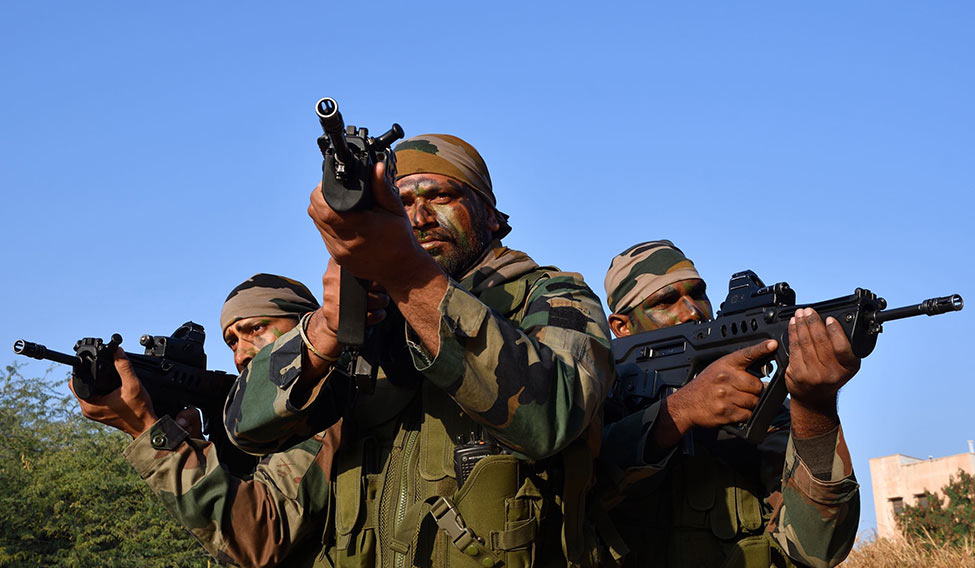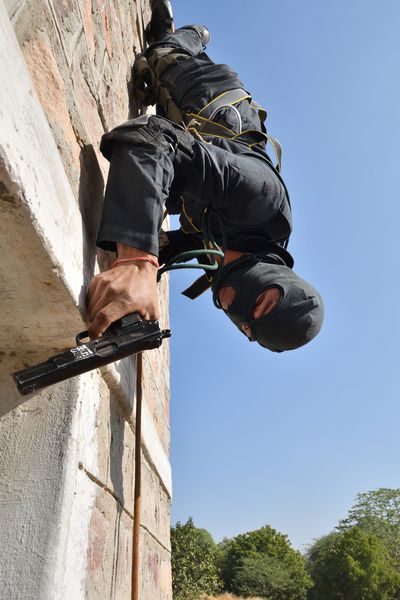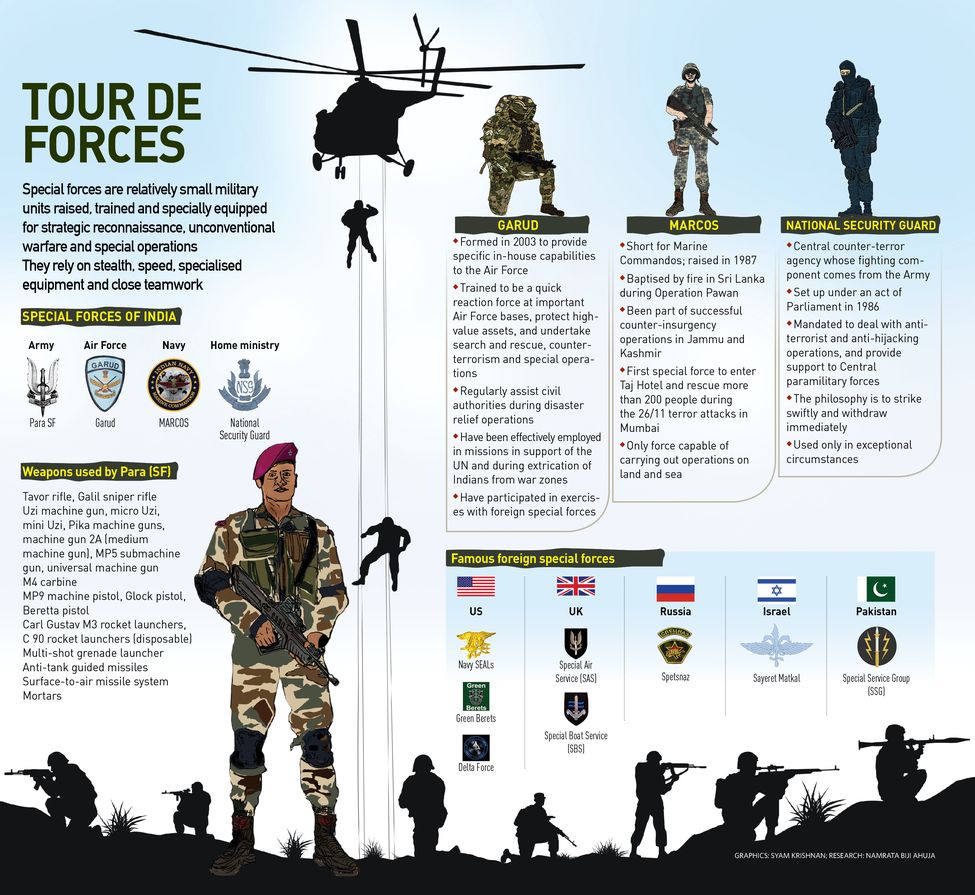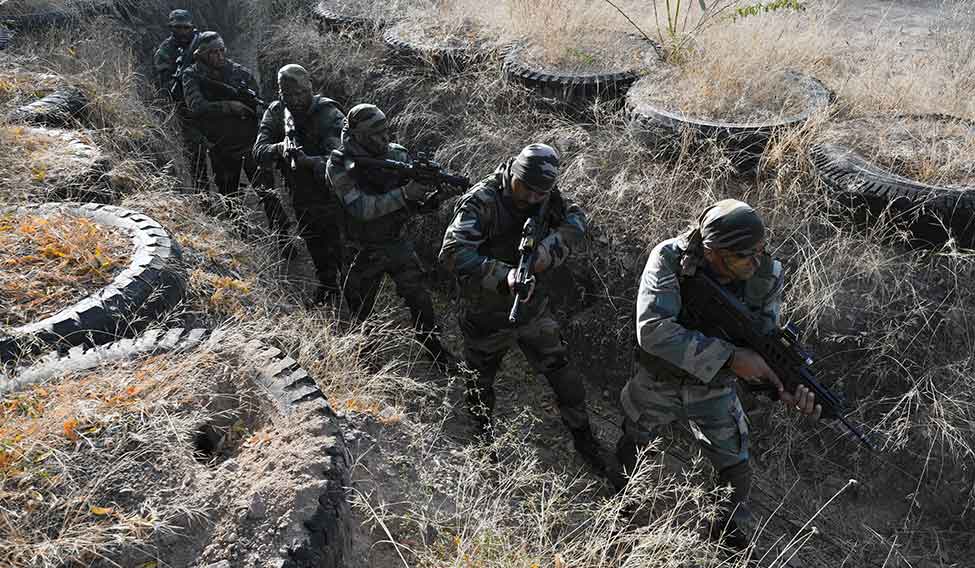Major Vikramaditya, 31, clearly remembers how he first came to hear about para commandos. It was in the summer of 2000, when he and his young friends had gathered at Vikram Park in Udhampur to witness para jumps in the run-up to the Infantry Day celebrations on October 27. “‘Para commandos are deadly. What they do, and who they are, I don’t know. But they can kill a human with their bare hands.’ These were the first words I heard from a classmate at the Army Public School in Udhampur,” says Vikramaditya, who was born in a small village called Chiryai near Udhampur.
The sight of the paratroopers filled the 14-year-old with awe. “I saw men coming down on parachutes, as if they were coming from some other planet, and landing right in front of us,” he says. “They were like men out of a fairy tale. They smiled and waved at the children happily, and it seemed to me that they had bulbs in their eyes.”
Vikramaditya’s father, a geologist, had always told him to follow his heart when choosing a career. That day, on the lawns of Vikram Park, Vikramaditya set his heart on becoming a para commando himself.
Seventeen years later, he is living his dream. He is a member of the 10 Para (SF), an elite unit of special forces commandos who are trained to be masters of battlecraft. They are so skilled in carrying out special ops behind enemy lines that each one of them is a weapon unto himself.
The para commandos are part of the Army’s Parachute Regiment. There are 14 units in the regiment—nine special forces and five para. The para units can airdrop deep into enemy territory and give tangible gains to ground forces. The special forces units can be launched into battle from land, air and water.
Among all the elite forces in the world, the para commandos have earned the reputation of being the toughest. Granted, the Americans and Israelis have better weapons and equipment, but when it comes to grit and valour, the para commandos are unmatched.
They proved it in June 2002, when India was invited for the first time to take part in a gruelling contest of special forces from across the world. “As luck would have it, I was reading the newspaper some days after the event,” recalled Vikramaditya. “I saw a headline: ‘When the going gets tough, India tops.’ It was a story on 10 Para (SF), which had come first in the special forces competition in Africa’s Kalahari Desert, defeating the likes of the Special Air Service of the UK and Green Berets of the US.”
 Eyes on target: All special forces commandos are experts in handling lethal tools and weapons.
Eyes on target: All special forces commandos are experts in handling lethal tools and weapons.
To win accolades, India’s para commandos had to overcome several challenges in the unforgiving Kalahari. At one point, a commando’s parachute apparently failed to open, and his emergency parachute landed him so hard that he broke an ankle. Still, the team went on to win the endurance test. Clearly, it is not for nothing that the para commandos call themselves the Desert Scorpions. They never lose their sting.
The year 10 Para (SF) outshone its British and American counterparts in the Kalahari, Vikramaditya joined the National Defence Academy in Pune. In 2006, after being commissioned as an officer in the Army, he volunteered to join 10 Para (SF) on probation. He was just 22 when his team commander first tasked him with leading an operation—searching for and eliminating terrorists in the higher reaches of Kashmir.
“I look responsible and mature today,” says Vikramaditya, who is tall and well built, with a chiselled face and piercing eyes. “But, back then, I was young and inexperienced, and I had a team to lead. In such situations, one learns that there is only a short distance between life and death…. But, when you spend 10 months in your battalion and two months at your home, there comes a time when there is no distinction between you and the battalion. You become the battalion.”
Vikramaditya has several identities today—he is a son, husband, father and, to fellow troopers, a brother. Like other para commandos, he is referred to by his code name during operations, and has taken part in several successful missions. But, ask him about those missions, and he smiles evasively.
The special forces swear by stealth and secrecy, and their exploits are not acknowledged publicly. An exception was in September 2016, when the para commandos carried out one of the biggest surgical strikes across the India-Pakistan border, killing more than a dozen terrorists. A few more silent, swift and deadly operations have since been carried out against the Pak terror apparatus, but none have made news.
THE WEEK spent days with Vikramaditya and his brothers in a desert area in Rajasthan, not too far away from the India-Pakistan border, and found that they had a lot in common with the place they were stationed. They were as raw, rugged and relentless as the landscape that could not be named. Para commandos of other units had also come to join them.
The smell of gunpowder hangs in the dry desert air. For the commandos, it is intoxicating and energising. Every day, they walk the wire between life and death. Part of their uniform is a striking red badge that reads ‘Balidaan’, or martyrdom. Do not be fooled, though. “If the enemy wants to die, we will do the needful,” says Vikramaditya. “At the same time, if we have to lay down our lives, we will not think twice.”
The SF teams operate in squads of six. Each of them master one of five basic skills—demolition, navigation, weapons, communication and providing medical assistance.
 Shock and awe: A para commando storms a building during a training session.
Shock and awe: A para commando storms a building during a training session.
The basic training for all special forces units is the same. It is only the specialisation that makes them different. “Every man in the battalion is a trained medic and a qualified desert driver,” says Major Shatrujeet, an ace combat free faller and diver. “Free fallers use techniques like HAHO (high altitude high opening) and HALO (high altitude low opening) to jump out of aircraft and drop deep inside enemy territory. The combat divers, on the other hand, launch themselves into war zone using water bodies. They are not just a threat to enemy vessels, but can also cause mayhem on ground.”
A soldier does not get selected straight into the special forces. Instead, officers or jawans belonging to regiments volunteer to join the SF. They undergo a three-month probation, and are free to leave the special forces and return to their parent units.
The volunteers are expected to be daring—like being ready to jump out of an aircraft at 20,000ft. During the 1971 Indo-Pak war, a couple of them had even jumped straight into battlefield, without undergoing any training. “There is some madness about the men who make it to the special forces,” says Shatrujeet. “These are men who can go beyond what a normal man can do.”
A key part of training is the ‘survival week’, when a probationer learns to live off the land. “Special forces operations are long-duration operations, which can vary from a couple of days to a fortnight or more. There are times when the ration the commandos are carrying may not suffice. In such situations, their survival skills come into play,” says Shatrujeet.
Probationers are left in the wild, where they learn to eat anything that is edible. “Majority of the plants that are found in the jungle are edible,” says Captain Sangram, who has just completed probation. “The plants that are dark in colour, taste bitter or have sap flowing out of them should be avoided. Everything else can be eaten. In the case of animals, one needs to clear its alimentary canal, before eating the rest of it.”
The commandos are trained to handle cobras and vipers. “He is exposed to poisonous snakes, which he has to catch with his bare hands. It helps in overcoming one’s fear. When the same commando has to handle explosives, he knows how to deal with high-pressure situations,” says Sangram.
During the probation period, unit training cells comprising an officer and a few jawans test each volunteer’s physical and mental limits. Major Dhruv, who has been with 10 Para (SF) for eight years, grins while talking about his probation days. “I was asked to run 20 kilometres with 30kg load every day for a week,” he says. “I was also made to crawl in the blazing sun, and sit in a ditch at night keeping vigil. After a week, I was in a state of delirium. I was then asked to give a write-up on assault rifles. When you can’t keep your eyes open or think clearly, how can you write anything? But, that is where your mental strength is tested.”
The probationers are denied even basic amenities. “Your sleep cycle, daily routine and ability to think straight are tested,” says Dhruv. “Often, volunteers give up within hours, or after a few weeks. Those who survive it—two or three in a hundred—get a chance to join the special forces. There have been times when no one was selected.”
Every man has his breaking point. “I suffered a stress fracture in my leg during probation. That was my tipping point,” says Dhruv. According to him, para commandos are trained to think clearly, and yet do unexpected things. “It is only then that the enemy will not be able to anticipate what I am going to do next,” he says.
When asked where he sees himself after some years, Dhruv says, “I did not join SF to become a senior officer one day. I came here out of choice, to be with the best in the business. I don’t think beyond the next firefight and the next hockey game. Anything more than that would be a bonus.”
A tall, barrel-chested man, Dhruv can bench-press double his bodyweight. He practises martial arts and is an expert in handling lethal tools and weapons. “Each skill and every bit of training come in handy when we go for operations,” he says.
On June 25 last year, SF commandos were tasked with eliminating terrorists holed up at the Delhi Public School in Srinagar. “It was a tedious task as it involved a complex building structure with hundreds of rooms,” says Major Shaurya, who has spent three years in the Valley. “The layout of the building was such that natural cover was available to the terrorists. This gave them advantage.” Still, the commandos outmanoeuvred the terrorists and killed two of them after a 14-hour gun battle.
But, outcomes are not always positive. In February 2016, Captain Pawan Kumar and Captain Tushar Mahajan died fighting terrorists holed up in the Entrepreneur Development Institute near Pampore in Kashmir’s Pulwama district.
The son of a headmaster in a village school in Haryana’s Jind district, Pawan had always dreamt of joining the Army. When he completed class 12, he joined the sought-after maths (honours) course at Ramjas College in Delhi. But, he quit and joined the Army after he received a letter from the Services Selection Board.
After spending a year in the Dogra regiment, he volunteered to join the special forces. After probation, he joined counterinsurgency operations in Kashmir. He was advised to go on medical leave after he was injured in one of the operations. “He requested the doctor not to endorse the leave, and returned to join the team,” recalls Vishal Ahlawat, Pawan’s friend and fellow para commando.
Pawan’s father, Rajbir Singh, 54, spoke to THE WEEK on Army Day (January 15), which is also Pawan’s birthday. “When your own child sacrifices his life for the country, what greater happiness can you get,” he said. “All of us should be ready to make that sacrifice. People die in accidents, too; so why should anyone fear death? God has created human beings to do glorious deeds. That is my message to the youth today.”
Said Dev Raj Gupta, Captain Tushar Mahajan’s father and a renowned physicist: “I am a proud father. It is true he has left us, but someone has to do this job, too. Yes, we miss him.”
Tushar’s mother, Asha Rani, 55, recalled that he used to move around her in circles, teasing her, before kissing her goodbye and leaving the house. “The last time he came to meet us and left home, he did not do that,” she said. “I miss having him around me. He treated me more as a friend than as his mother.” Today, the void left by Tushar is filled by his brother commandos, who seek Asha Rani’s blessings whenever they get a chance. Both Tushar and Pawan were awarded the Shaurya Chakra posthumously.
Back in the deserts of Rajasthan, Vikramaditya and his team of para commandos are preparing to leave for “tasks” assigned to them by the commanding officer. They had been discussing plans, and working out details, well into the wee hours.
Wherever he goes, Vikramaditya carries a small backpack containing a water bottle, a small prayer book and a diary gifted by his three-year-old daughter. Some pages in the diary have motivational quotes—“Every day, move ahead from where you are,” reads one. Other pages have to-do lists: “Internet for parents”, “Look for post-retirement avenues for troops”, “Have lunch in team langar today”, and so on.
Vikramaditya explains that the entries in the lists are marked in blue, black and red. The tasks he has completed are ticked blue, those in the works are black, and those yet to be started are marked red. He says he likes his life to be “sorted”. As he folds his diary, puts it back in his bag, and hops on to a bicycle gifted by his wife on his birthday, he looks a lot like a common man going home after a long day’s work.
“Wives of para commandos are special, in the sense that they remain an equal partner in their husband’s life,” he says with a proud smile. “They talk to the ladies and family members of the jawans, and sort out problems when their husbands go for operations. They keep their own fears and insecurities to themselves.”
A bright and bubbly woman, Vikramaditya’a wife is the pillar of strength for the family. “We don’t pass on our fears to children,” she says. “There is as much fun and frolic in our house as in any other home. An occasional call or message from my husband is enough reassurance.”
She then smiles and shares a secret: “Even on WhatsApp, I tell him, ‘Chitthi likhte rehna [Keep writing to me].’ That’s how I sign off.”
The hour has come for Vikramaditya to leave. He has covered his face using a green shemagh, leaving only his eyes visible. He has left his bicycle in the barracks, and is out in the bone-chilling cold of the desert. It is pitch dark and silent, and I am reminded of what he had said once: “If you talk or whisper, each word that you speak will be heard by the enemy. This is what is so different about deserts. It carries each sound.”
He climbs into a rugged jeep that will soon take him to the edge of Indian territory. There, he would become invisible, but vulnerable to the elements and the enemy. In a way, however, he would be at home.
It was about men like Vikramaditya that Bernard Law Montgomery, the legendary field marshal, once said, “What manner of men are these who wear the maroon beret? Men apart, every man an emperor.”
Names of serving men have been changed.







